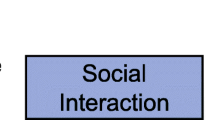Abstract
The social sciences have long employed simulations and statistical models in their research methodology as testing and validation tools. Recent advances in complex networks have produced a set of new graph-based tools with which to study and characterize larges-scale, complex social data. We propose a swarm simulation platform that allows quick prototyping of agent-based social models, using an iterative simulation development cycle. This platform is designed to provide meaningful graph-based metrics of the social ties formed. A description of the system is given, as well as experimental results obtained from sample models.
Access this chapter
Tax calculation will be finalised at checkout
Purchases are for personal use only
Preview
Unable to display preview. Download preview PDF.
Similar content being viewed by others
References
Albert, R., Barabási, A.: Statistical mechanics of complex networks. Reviews of Modern Physics 74(1), 47–97 (2002)
Barabasi, A., Jeong, H., Neda, Z., Ravasz, E., Schubert, A., Vicsek, T.: Evolution of the social network of scientific collaborations. Physica A: Statistical Mechanics and its Applications 311(3-4), 590–614 (2002)
Brown, D.J., McFarland, D.D.: Social distance as a metric: A systematic introduction to smallest space analytics. In: Bonds of Pluralism: The From and Substance of Urban Social Networks. Wiley, Chichester (1973)
Davidsson, P.: Agent based social simulation: a computer science view. The Journal of Artificial Societies and Social Simulation 5(1) ( January 2002)
Girvan, M., Newman, M.E.J.: Community structure in social and biological networks. Proceedings of the National Academy of Sciences of the United States of America 99(12), 7821–7826 (2002)
Jeong, H., Néda, Z., Barabási, A.L.: Measuring preferential attachment in evolving networks. EPL (Europhysics Letters), 567 (2003)
Latane, B., Liu, J., Nowak, A., Bonevento, M., Zheng, L.: Distance matters: Physical space and social impact. Pers. Soc. Psychol. Bull. 21(8), 795–805 (1995)
Lazer, D., Pentland, A., Adamic, L., Aral, S., Barabasi, A.-L., Brewer, D., Christakis, N., Contractor, N., Fowler, J., Gutmann, M., Jebara, T., King, G., Macy, M., Roy, D., Van Alstyne, M.: Computational social science. Science 323(5915), 721–723 (2009)
Lewis, K., Kaufman, J., Gonzalez, M., Wimmer, A., Christakis, N.: Tastes, ties, and time: A new social network dataset using facebook.com. Social Networks 30(4), 330–342 (2008)
Luke, S., Cioffi-Revilla, C., Panait, L., Sullivan, K., Balan, G.: Mason: A multiagent simulation environment. Simulation 81(7), 517–527 (2005)
Newman, M.E.J.: Assortative mixing in networks. Physical Review E (2002)
Newman, M.E.J.: Mixing patterns in networks. Physical Review E 67(2), 26126 (2003)
Noel, H., Nyhan, B.: The unfriending problem: The consequences of homophily in friendship retention for causal estimates of social influence. In: Sunbelt Social Networks Conference (2010)
Palla, G., Barabasi, A.-L., Vicsek, T.: Quantifying social group evolution. Nature 446(7136), 660–667 (2007)
Renyi, A., Erdos, P.: On random graphs i. Publicationes Mathematicae, 290–297 (1956)
Preciado, P., Snijders, T., Burk, W., Stattin, H., Kerr, M.: Does proximity matter? distance dependence of adolescent friendships. Social Networks (2011)
Snijders, T., van de Bunt, G., Steglich, C.: Introduction to stochastic actor-based models for network dynamics. Social Networks 32(1), 44–60 (2010)
Sridharan, A., Gao, Y., Wu, K., Nastos, J.: Statistical behavior of embeddedness and communities of overlapping cliques in online social networks. arXiv 1–9 (September 2010)
Li, X., Mao, W., Zeng, D., Wang, F.-Y.: Agent-Based Social Simulation and Modeling in Social Computing. In: Yang, C.C., Chen, H., Chau, M., Chang, K., Lang, S.-D., Chen, P.S., Hsieh, R., Zeng, D., Wang, F.-Y., Carley, K.M., Mao, W., Zhan, J. (eds.) ISI Workshops 2008. LNCS, vol. 5075, pp. 401–412. Springer, Heidelberg (2008)
Yi, W., Bin, W., Shengqi, Y.: Commtracker: A core-based algorithm of tracking community evolution. Journal of Frontiers of Computer Science and Technology 3(3), 282–292 (2009)
Author information
Authors and Affiliations
Editor information
Editors and Affiliations
Rights and permissions
Copyright information
© 2011 Springer-Verlag Berlin Heidelberg
About this paper
Cite this paper
Cajias, R., González-Pardo, A., Camacho, D. (2011). A Swarm Simulation Platform for Agent-Based Social Simulations. In: Brazier, F.M.T., Nieuwenhuis, K., Pavlin, G., Warnier, M., Badica, C. (eds) Intelligent Distributed Computing V. Studies in Computational Intelligence, vol 382. Springer, Berlin, Heidelberg. https://doi.org/10.1007/978-3-642-24013-3_28
Download citation
DOI: https://doi.org/10.1007/978-3-642-24013-3_28
Publisher Name: Springer, Berlin, Heidelberg
Print ISBN: 978-3-642-24012-6
Online ISBN: 978-3-642-24013-3
eBook Packages: EngineeringEngineering (R0)




